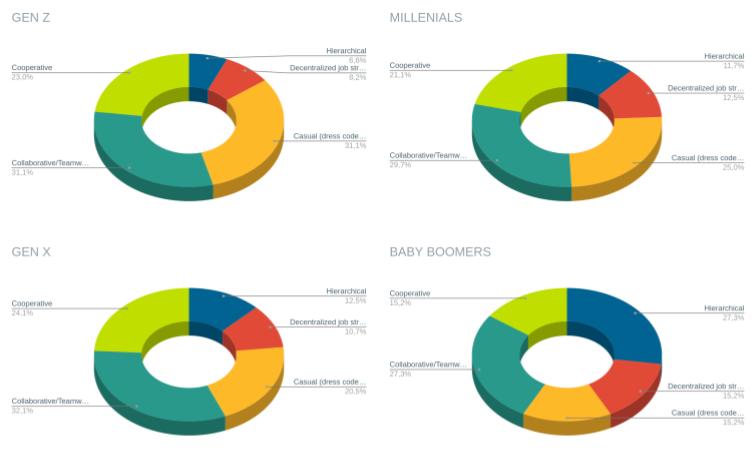31. What are your preferences for workplace? (You can choose more than one.)

This question asks participants to indicate which structural and cultural characteristics they prefer in a work environment, being able to select multiple options. The data collected is broken down by generation, offering an insight into how each group interprets and desires the organisation of the workplace.
The options are: Hierarchical, Decentralized job structure, Casual, Collaborative/Teamwork, Cooperative
Overall, the analysis highlights a gradual generational shift towards more flexible, informal and collaborative workplace models: from the more rigid structures favoured by Baby Boomers, to the fluid and participative spaces sought by Gen Z.
Data show that Generation Z clearly favours informal and dynamic environments. The preference for a casual style, embracing both clothing and open communication, is combined with a strong orientation towards teamwork and cooperation. Traditionally hierarchical structures are less attractive, while there is more openness to more decentralised models, although still taking second place to the values of cooperation.
In summary, Gen Z seeks environments in which informality and teamwork are central, with less hierarchical rigidity.
Millennials also show a preference for collaborative and cooperative environments, valuing the possibility of working in teams, sharing responsibilities and maintaining an informal communication approach. While appreciating more agile and decentralised structures than classical hierarchical ones, they tend to seek a balance between autonomy and coordination, adapting organisational flexibility to the need for effectiveness and innovation.
The ideal model for many Millennials is that of a fluid, inclusive and collaboration-oriented environment, but without losing clarity in roles.
Generation X generally shows greater tolerance for more traditional or hierarchical structures, especially when associated with clarity of roles and well-defined responsibilities. However, an appreciation for teamwork and the importance of a cooperative climate also emerges in this group, albeit often embedded in a more linear organisational structure.
The preference for cooperation is thus accompanied by a demand for stability and clarity, reflecting the career stage in which many members of this generation find themselves.
Baby Boomers tend to prefer more structured working environments, with an often hierarchical organisation that clearly defines roles and lines of responsibility. However, there is no lack of interest in cooperative contexts, especially to foster the transmission of knowledge and experience.
The informal or casual aspect may be less relevant for this group, which often prefers a sober and structured professional environment, where collaboration is understood as cooperation between experienced colleagues.
This post is also available in: German Italian Polish Portuguese (Portugal)







